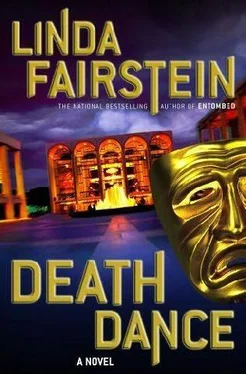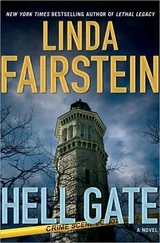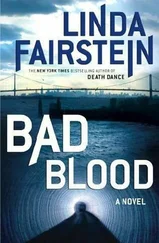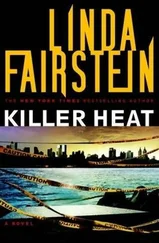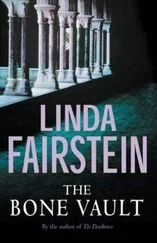From within we could hear the voices of the dancers, speaking in Spanish, and the sound of the running water from the shower.
Mike nodded at me. "Your territory, Coop. Check front."
I pushed open the door and entered the room.
The first area had been converted into a small lounge. Several sofas and chairs were against the wall, and three of the dancers-barefoot and robed, waiting their turn for the shower-were curled up and chatting with one another.
I passed by them to another section of the room. Instead of lockers, there were only open cubbies for their belongings and a coatrack on which their clothing hung.
The last chamber was the bathroom area: several toilet stalls, a row of sinks, and one entire wall that was mirrored. There were backpacks on the floor, magazines and iPods stacked beside them, and makeup on every flat surface.
One of the girls emerged from the shower, wrapped in a bath sheet with her head turbaned in a towel. She excused herself as she slid in front of me, and I pressed my back to the wall to let her pass.
My hands were flat against the surface, a smooth, glazed tile that was cold to the touch. I looked around and noticed the same old ceramic squares-undoubtedly the original 1920s design-covering the wall opposite the showers and creating a border along the ceiling edge and floor.
I walked to the empty shower stall, which was also elaborately tiled, then turned to study the dark blue and pale green of the mosaics worked into a white ground. What had Hubert Alden called the typically Islamic motifs? A foliate design, he had said.
I ran my fingers over the beautiful image. The flowers looked familiar to me-their shape and colors-and I tried to recall where I had seen something like them.
Foliate, of course. Beautiful flowers. They were tulips, Arabic style, created specially for the Mecca Temple. And the other time I had seen them was on the monitor in Joe Berk's bedroom.
The images we suspected Berk of watching-of stealing for some personal perversion by means of a hidden surveillance system-must have come to him from a camera that had been surreptitiously installed here in the dressing room used by many of the dancers who rehearsed at City Center, including Lucy DeVore and the late Natalya Galinova.
The eight dancers looked at me as though I were crazy when I asked them to get dressed so that I could bring a man into the lounge. " For favor - vistase! Avance! Tengo que traer un hombre aqui ."
I raised my voice, urging them to step out into the hallway, and even though I added a few " por favors ," they didn't move.
I walked briskly past the cubbyholes to the door, again calling to them to dress themselves because a man was entering.
The three who had been changing wrapped towels around their slim bodies and stood speechless as I called to Mike to come into the bathroom.
He was too embarrassed to even make a joke, so he marched behind me to the area near the showers that the girls had been smart enough to clear.
"Look familiar?"
"Twenty dollars, Coop. The question is, What was Joe Berk looking at when the monitor in his bedroom caught these tulips?"
"I'll take your twenty. Who was he looking at? That's the answer I want."
Mike ripped back the opaque shower curtain and stepped into the wet stall. He was trying to find signs of a concealed device, and repeated his search in each of the three cubicles.
I watched him run his hands around the tops of the metal frames, and in the last booth he came up with what he wanted.
"You got it?"
"Not a camera. But there's a recess drilled in the wall there. Can't see into it-we need a ladder. But it feels like there's a mounting that could have held a small camera, and it's slanted so that focus would be on the tiled wall in the background. C'mon, let's move. Be sure and thank the young ladies on your way out. We're going back to Berk."
Mercer and Stan were waiting for us in the hallway, and Mike took Mercer aside to explain what we had seen.
"Are you done now?" Stan asked.
"Haven't even started yet," Mike called back to him. "Who's the best tech guy you know?"
Mercer answered. "Vito. Vito Taurino. Right, Alex?"
"The guy's a genius," I said. "Does all Battaglia's wiretaps and video surveillance. The kind the courts allow."
"We gotta find him now. Yesterday. Get him up here."
"I'll call Battaglia. But could someone really transmit video images from inside that shower stall?" I asked.
"It's all wireless now, Coop. It's called microwave technology- and I don't mean the kind you cook with. We used it in that murder investigation at the social club on Mulberry Street. You just need a board camera the size of a computer chip-the lens sits flat up on it-and mount it almost any place with brackets, like in that recess. Wire it through the back of the wall. Or maybe there's a dropped ceiling in the bathroom. Vito can check."
Mercer took over the explanation. "Run that up to an antenna."
"But where?" I asked.
"Just stick one on top of the building. Any building."
"Better yet," Mike said, talking to Mercer. "How about this dome? Stick a Yagi right on top of this mother, point if at a repeater, get the popcorn ready and-"
Mercer snapped his finger. "You're at the movies."
"Slow down. What's a Yagi?"
"It's a kind of antenna," Mercer explained. "You can direct them, orient them so they're facing repeaters, and the repeaters carry them the distance, to wherever the monitors are waiting."
"There are repeaters all over town," Mike said. "On top of the Empire State Building, Thirty Rock Center, the George Washington Bridge."
"Think nine-eleven," Mercer said. "When the towers collapsed, even your cell phones went dead downtown 'cause all that relay equipment was on top of the Trade Center."
I was beginning to understand. "And the camera just rolls all the time?"
"Probably motion activated," Mike said. "Someone steps in range of the lens and it's showtime."
The bathroom door opened and one of the enraged Argentines called Stan over for an explanation. He tried to mollify her but clearly wasn't successful.
"You two try to get some answers from Berk. I'll take Stan back up to the main office and see what other information they've got that might help. If Galinova was tenting rehearsal space, there have to be records of the dates. Somebody most have information about when she was here and who else hung out around her. You'll be back to me?" Mercer asked.
"Yeah. We'll stay in touch."
Stan tried to free himself when he saw us walk away. "If you're leaving, you'll have to go out the Fifty-sixth Street side. The theater's dark tonight. The entrance you came in is closed after five."
We left Mercer in the hallway. Stan was surrounded by three agitated dancers, as we waited for the elevator that returned us to the first floor. A small arrow pointed in the direction of the 56th Street exit and we followed the snaking corridors to make our way out.
The narrow, dark passages of the ground floor of the old building were lined with posters that re-created the theater history of the past few generations. I hurried to keep pace with Mike's long strides, past the life-size and youthful Lenny Bernstein-"vital music performed under a stimulating young conductor"; Mike Todd presenting Maurice Evans in Hamlet with the top ticket price of $2.40; and the 1948 image of George Balanchine and Lincoln Kirstein, whom City Center had invited to establish a resident ballet company- which later became the New York City Ballet.
It was after five o'clock and workers were beginning to emerge from office buildings up and down the street. Mike cut a path through the crowds and I followed in his wake, down 56th and south on Sixth Avenue, then around the corner until we found the car.
Читать дальше
